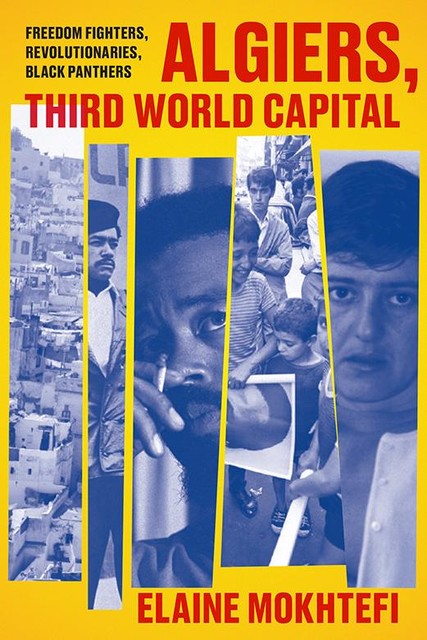Algiers, Third World Capital
This book is currently unavailable
283 printed pages
Impressions
- Muhammadshared an impression2 years ago👍Worth reading
Quotes
- Muhammadhas quoted2 years agoThe youngest of six boys, Mokhtar was born and raised in Berrouaghia (the Asphodels), a village in the plateau region south of Algiers. He was the only one of the brothers to graduate from high school, a French lycée. It was there that he began organizing for Algerian independence, creating and recruiting for an FLN clandestine cell. In 1957 he joined the liberation army, receiving training as a radio operator in the newly formed signal corps. He was deployed in the southern war zone at the head of a transmissions detachment.
In 1962, Mokhtar was elected president of UGEMA, the national student association, and tasked with its reorganization in the newly liberated country. He attended college in Algiers and obtained masters’ degrees in sociology, economics and law in Paris. He held positions in the Ministry of Agriculture and Agrarian Reform—in charge of training and education—as well as in several state companies. Later, in Paris, he wrote illustrated books for young readers on Islam, the Arab world, and North Africa.
Mokhtar had given his life to Algeria. He and his comrades joined the liberation army prepared to die for their flag and more—for an idea, for justice. Following independence, to see the ideals they had fought for soiled, spit upon, was more than he could bear. When I was deported for refusing to become an informer for the military police, it was the final blow. As he wrote at the time: “My last illusions are gone. Exile remains the ultimate solution when mediocrity and feudalism triumph and return as our judges.”
Mokhtar lived for twenty years in Paris and twenty years in New York. Paris often tore at his entrails. He felt surrounded by the racism of his youth. He was happy in New York, despite the frightening lack of sympathy for Palestine. He felt free here, and found peace in writing. His final book, J’étais français-musulman. Itinéraire d’un soldat de l’ALN, was a memoir of his life, telling how he became a nationalist, a militant, and a soldier of the Algerian liberation struggle.2 When he learned that Éditions Barzakh of Algiers would publish the manuscript in 2016, he felt the warm rush of accomplishment.
A few days after his eightieth birthday, Mokhtar learned that he had liver cancer. “I want to go home with Elaine and die there,” he told his doctor. “My life is behind me.” His last piece of writing was a short text in English: “I had a wonderful life,” it declared. “I don’t want to waste Elaine’s time and mine going to hospitals and clinics. We adore each other and want to protect our happiness.”
Mokhtar’s last words to me: “Je t’embrasse.” - Muhammadhas quoted2 years agoMokhtar returned to Algeria once a year to see his family and visit the graves of his mother and father in Berrouaghia, his hometown. “Ils m’ont donné la vie,” he would say. (They gave me life.)
Mokhtar died on April 4, 2015. He was eighty years old. Ten days earlier, barely able to raise his body from the bed, he dressed, leaned on a cane, and slowly climbed the slight incline to Broadway. We hailed a taxi and crossed the entire city from west to east to reach the Algerian consulate near the UN. He wanted to finish his business with Algeria, to provide his nephew Djamel with an authorization to act in his name for family affairs - Muhammadhas quoted2 years agoMokhtar’s talent as a researcher and writer was recognized by two of the top French publishers. His first book, an illustrated history for teenagers, Aux premiers siècles de l’Islam (The Rise of Islam) was published by Hachette in 1985 and translated into English, Indonesian, German, Japanese, Polish, and Portuguese. A second illustrated book, L’Égypte au présent, came out in 1989. Éditions Nathan published Les Arabes au temps de l’âge d’or (The Arabs in the Golden Age) in 1991 and Maroc, Algérie, Tunisie: les pays du Maghreb in 1992, also illustrated history books for young readers. A revised edition of his first book with a new title, Les débuts de l’Islam, came out in 2003.
Still refusing to be outdone, I published, in 1990, an illustrated book for young readers on the American Civil War, La Guerre de Sécession, with Éditions Nathan. In 1992, for Albin Michel, another French publisher, I wrote and produced an illustrated book with Yann Le Béchec, a very fine artist, called New York Quartiers Noirs. I published two travel guides with Hippocrene Books of New York in 1991 and 1993, Insiders’ Guide to Paris and Language & Travel Guide to France. Finally, Paris: An Illustrated History was published by Hippocrene in 2002. After a trip to Buenos Aires in 2005, I illustrated a series of my own Japanese-style tanka poems for a chapbook.
fb2epub
Drag & drop your files
(not more than 5 at once)


